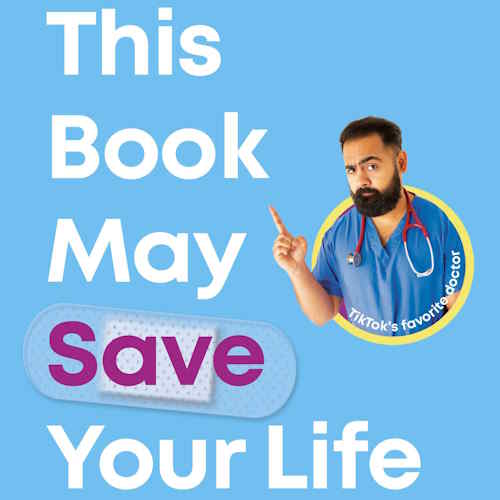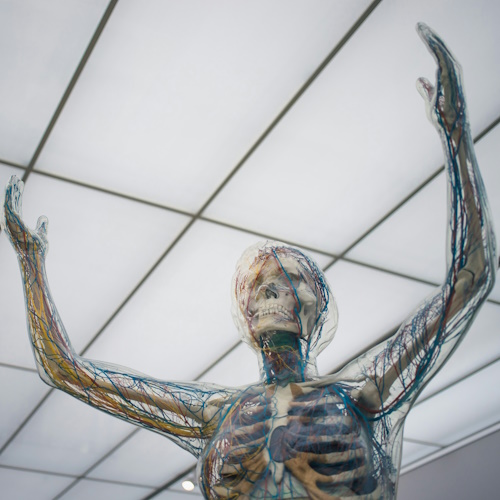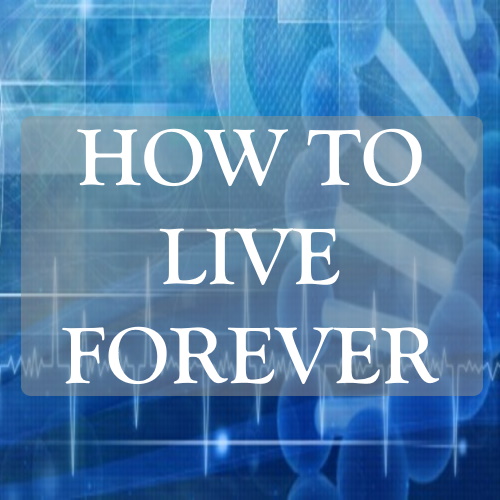This Book May Save Your Life
Everyday Health Hacks to Worry Less and Live Better, a book written by Karan Rajan
The hilarious, myth-busting survival guide to the human body from TikTok's favourite General Surgeon.
Though the odds are stacked against us, the human body has an extraordinary tendency to survive...
Full of hard-learned lessons and health hacks from Dr Karan Rajan's years working the hospital wards, This Book May Save Your Life is a head-to-toe ode to our amazing bodies - warts and all - that will help you to worry less and live better for longer.
Here, Dr Karan explains the weird and wonderful bodily functions that keep us going, and offers practical advice to help you thrive when things go wrong.
This Book May Save Your Life Book Review
I've seen a few of Dr Karan Rajan's videos and they are good - factual and entertaining at the same time - so I was looking forward to reading his book.
It's clear from the title that he's not talking about radical life extension, but trying not to die in the near future and live as healthy and long life as possible. Of course, this is the first step to living indefinitely (don't die!) so I was keen to find out how his book MAY save my life. And it sort of does that.
Dr Rajan describes the book as "a survival guide to this meat suit in which you’re trapped for life." I'd call it more of a maintenance manual than survival guide, which is not a bad thing. It is an entertaining ride through human biology, full of fascinating facts, and presented in his slightly cheeky way. Though, perhaps, he tries toO hard to keep this up throughout the book with many throwaway lines that seem to have been shoe-horned into the text (e.g. "your mouth uses chemical warfare tactics").
There are "health hack" sections throughout the book, though strangely not always linked to the subject of the chapter they are located in. Also, some of the hacks aren't things you can personally benefit from (e.g. plants thrive when you pee on them).
On the positive side, This Book May Save Your Life is crammed full of interesting information (just see the highlights below as a few examples), and is a light-hearted introduction to how the body works, including plenty of random facts that probably aren't in school text books. If you're looking for a summer holiday book to read and enjoy, rather than an organised reference guide to a healthier lifestyle, then I'd highly recommend this one.
Highlights
Here are 101 key points from The Longevity Imperative:
- You should actively seek out and aim to consume plant foods, seafood, and fermented foods often.
- You should aim to consume about 2 litres of water over the course of each day.
- Smokers not only have a reduced life expectancy, but they also experience proportionally more years of poor health.
- Your existence began as an embryonic, disconnected anus floating around in your mother’s uterus.
- On some level your gut also serves as a second brain.
- The microbiome is made up from around 4,000 different bacterial species.
- We would do well to stop thinking of ourselves as individuals and more as team members alongside an array of tiny organisms.
- The oft-repeated dietary mantra, ‘eat the rainbow’ really does have some basis in science.
- A diet very high in red meat and particularly those reliant on ultra-processed foods can upset the microbiome.
- The digestive system isn’t really inside us, it’s a member of the outside world that transits through us.
- If you have a sore throat, you may find that eating something, or simply just chewing gum, to stimulate the production of pain-busting chemical-infused saliva, may ease your symptoms.
- For the most part, the pungent odours on your breath are produced by bacteria that feed on decomposing food.
- Taking large doses of ibuprofen, or taking it over a long period of time, can heighten the risk of ulcer formation in the stomach.
- It takes around ninety minutes for 50 per cent of the contents of the stomach to empty into the small intestine.
- It’s usually a good idea to avoid eating in the two to three hours before you go to bed.
- Ginger is known to contain anti-nausea properties, mainly due to the less than ingeniously named chemical gingerol.
- The liver can tackle more toxins in a minute than a lifetime of juice cleanses.
- Damage to the common bile duct, which connects the liver to the small intestine, can cost a patient up to a decade of life.
- About 10 per cent of the population develop gallstones in their gallbladder.
- It’s believed the appendix plays an important role in repopulating the microbiome of the bowel.
- About 90 per cent of our food is absorbed in the small intestine.
- Everyone has a unique evacuation rate, so don’t be comparing bowel-movement frequency with co-workers.
- Us humans pass an average of fourteen farts a day.
- You could be said to be constipated if you fail to go less than three times in a week.
- Overuse of laxatives can even impact gut function by weakening the intestinal muscles and nerve response.
- Aim to limit your time on the loo for number twos to a maximum of ten minutes, but ideally no more than five; and avoid straining at all costs.
- Those who notice any kind of grey-whiteish discoloration in their poo should consult a doctor.
- Constipation is rarely a diagnosis in its own right, merely a symptom of something else.
- Wet wipes might seem like a good option, but they contain chemicals that can kill good bum bacteria.
- Gut microbes can send chemical signals to your brain nudging you to consume whatever they need for their own survival.
- Your brain consumes 20 per cent of your energy reserves.
- You use 100 per cent of your brain for various things all the time.
- Dementia pugilistica isn’t just seen in boxing but also in virtually every contact sport, from rugby to American football.
- Three or more concussions had a significantly more deleterious effect on a person’s cognitive function.
- A deficiency of vitamin D can cause low mood, which is why people sometimes suffer from seasonal affective disorder in the winter.
- Omega-3 supplements haven’t yet shown the same effects as the omega-3 found in food sources.
- Constant task-switching reduces the quality and efficiency of your work.
- Make sure you still continue to test your brain every now and then.
- Aerobic exercise such as walking or running can materially increase the volume of the hippocampus, a brain region associated with memory.
- An archaic feature called the mammalian diving reflex, which is triggered when you plunge your face into cold water while holding your breath, is known to decrease anxiety and stress.
- My patients were able to better cope with their pain once they understood the causes and possible treatments.
- Receptors on your burned hand do not send pain signals to the brain. They just sends signals.
- Most of you will have the luxury of experiencing roughly 3 billion heartbeats in a lifetime.
- In the UK, heart disease contributes to more than a quarter of all adult deaths.
- The heart is fitted with two little arteries, about 3mm in diameter.
- Exercise allows heart vessels to grow tiny new blood vessels.
- Extreme endurance athletes like ultra-marathon runners can develop various heart rhythm abnormalities and heart damage.
- Periods of emotional upheaval can lead to a stress-induced cardiomyopathy or takotsubo cardiomyopathy, a weakening of the heart muscle.
- We should look to limit our salt intake to under 5g a day.
- A reduction in red meat intake can only help to lower cholesterol and promote good heart health.
- Every decrease of ten of your systolic blood pressure, your stroke risk goes down by 27 per cent and your risk of heart disease by 17 per cent.
- In many cases, high cholesterol can be managed with diet, exercise and lifestyle changes.
- Poor sleep can contribute to insulin resistance and elevate your blood glucose.
- The primary drive for breathing is your body’s abhorrence of too much carbon dioxide.
- The accumulation of microscopic scars from smoking, inflammation or infection can damage the collagen and elastic fibres in the alveoli.
- Nasal breathing helps to filter, humidify and clean the air before it enters your sensitive internal environment.
- Milk doesn’t contain enough calcium to maintain your bones.
- Sunscreen does not ‘reduce’ vitamin D production.
- Heading out for a jog can in fact stave off osteoarthritis for longer.
- There are fifty-two bones in both feet. That amounts to a quarter of your skeleton.
- Sometimes simple exercise is key to alleviating back pain and restoring both mobility and strength.
- Your retina is technically part of your brain.
- The melanopsin retinal ganglion cells perform mainly non-image-forming visual functions like regulating sleep–wake cycles, mood, cognition, the release of various hormones and metabolic rate.
- If you spend a lot of time in front of a screen (which is likely to be most people), then adopt the 20/ 20/ 20 rule.
- Constantly rubbing your eyeballs could be a cause of keratoconus - a condition in which the cornea bulges out and your eyeball literally changes shape.
- Your corneas don’t have any blood supply, in fact they’re the only part of the human body to survive without it.
- Up to 70 per cent of people’s ears make noises known as otoacoustic emissions.
- Ear hair cells do not repair themselves or grow back.
- Mucus from the nose is typically clear; a yellow tinge indicates a smouldering infection, and green suggests a bacterial infection.
- Losing your sense of smell can sometimes be an underlying marker for high blood pressure.
- Your sense of smell accounts for 80 per cent of the perception of flavour.
- The tongue boasts around 8,000 taste buds, all of which contain receptors that allow them to detect sweet, sour, salty and bitter and even the recently discovered umami.
- A strawberry-coloured tongue that is larger than usual could suggest a B12 iron or folate deficiency.
- People with blocked noses tend to consume more food than necessary because it’s not satisfying enough.
- The cells on your skin surface are being constantly replenished with new building blocks known as keratinocytes.
- Your skin is in fact a microbiome crawling with billions of bugs, home to over a thousand varieties of bacteria.
- You often stop the various organisms and bacteria on the skin's surface from doing their important work by overzealously washing them away.
- A good, healthy routine comes down to washing your face regularly, moisturising and wearing a sunscreen every bloody day.
- Do something that fills you with wonder and awe... blowing your mind can help to keep the brain firing on all cylinders long into old age.
- An increase in scrotal temperature by even as little as 2 degrees can negatively affect sperm formation.
- If you do notice any swelling or lump [in your testicle] that is growing in size or shape – even if painless – get it checked out.
- The only reason we don’t just whip the pointless lump [prostate] out is literally because it’s wrapped around vital pipes.
- One of the most important things we fail to teach girls in sexual health is the art of wiping from front to back after going to the toilet.
- I would recommend that women avoid douching and inserting so called ‘feminine hygiene products.’
- Your bladder has a storage capacity of around 500–700ml (about 2 cups of water).
- The bladder works and empties best when the pelvic floor muscles and abdominal muscles are slightly relaxed.
- Sitting down to pee provides optimal flow dynamics for both women AND men.
- The simplest way to avoid most cases of kidney stones from forming is by staying hydrated.
- Sleep is the foundation of all facets of health – both mental and physical.
- For the sake of your well-being, there are very few things that can’t be postponed for at least thirty minutes after waking.
- Shift workers like medical professionals, factory workers and flight attendants who hop times zones have a significantly higher risk of various cancers, metabolic disease, mental health problems and even cardiovascular disease.
- Sleeping pills and alcohol may restrict the deeper brain waves seen in the restorative phase [of sleep], which can contribute to feeling groggy the next morning.
- Fibre doesn’t just promote the microbes in your gut that help to break down food; it also trains your immune system to fight off infections.
- Alcohol can suppress your defences and reduce the numbers of good microbes in your gut.
- Cancer is an umbrella term that encompasses hundreds of wildly different pathologies.
- Apply sunscreen even on days with thin cloud cover.
- Cleaning your bum hole with a cheeky finger whenever you shower or bathe could save you from a world of irritation and pain.
- Because death can seem such a long way away, our language surrounding the topic has become abstract and sanitised. We don’t die or expire. We pass away, rest in peace or cross the rainbow bridge.
- Learning to talk about death can be curiously comforting.
- A 91-year-old Polish woman spent eleven hours in cold storage at a morgue before waking up to complain that she was cold and wanted pancakes.
- Once you are brain dead, there’s no coming back.
Visit website: https://www.penguin.co.uk/books/451514/this-book-may-save-your-life-by-rajan-dr-karan/9781529136326
Details last updated 26-Apr-2024






